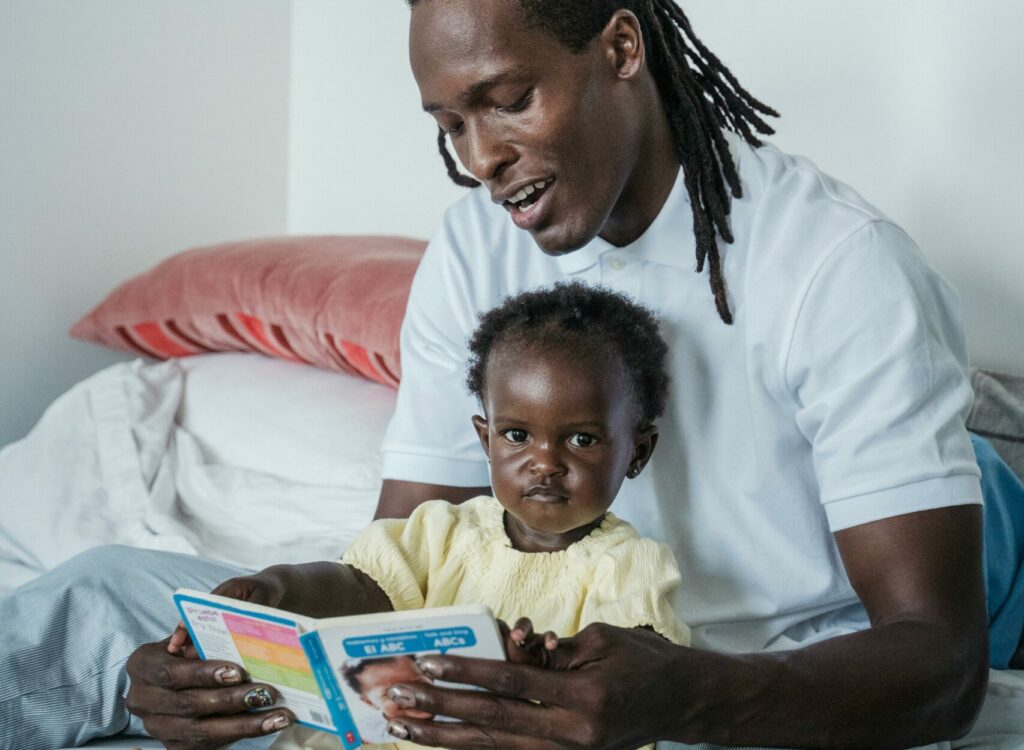
Children build most of their speech and language skills during their first three years of life.
You are your child’s first teacher. The more words your baby hears from you, the better prepared they will be to learn.
Small, everyday moments provide powerful opportunities to help your child grow these skills. Try talking, reading, rhyming, and singing while changing a diaper, giving a bath, or preparing a meal.
Narrate your day to your little one. What are they looking at? Name it. What are you doing? Tell your child. You may feel silly at first, but hearing lots of words helps your child learn language.
Read a book to your baby every day—in whatever language you feel most comfortable—beginning at birth. And if you don’t feel comfortable reading words, you can point out the pictures in the book and talk with your baby about them.
Say and sing rhymes like ‘The Itzy Bitzy Spider’, ‘Head, Shoulders, Knees & Toes’, ‘Twinkle Twinkle Little Star’, and ‘Wheels on the Bus.’
Sing the ABC song and any songs you love during diaper changes, while washing hands, when you are getting their food ready, and more!
Talk to your child you go about your day – while you get them dressed, while they play, while you cook, when you’re out at the store… the possibilities are endless
Learn how to create a lullaby from singer-songwriter and mother Emily Eagen. Don’t worry if you’re not a singer – YOUR voice is your child’s favorite voice to hear!
Play rhyming games, listen to rhyming songs, sing rhyming songs in your home language. Rhyming is an important pre-literacy skill.
Read books, letters, street signs, text messages… the more you read, the more they learn!
Talk, read, rhyme, and sing with your child often – in both your native language as well as other languages you know. Research from brain scientists and linguistic experts tells us that a child who learns many words in their home language will have a stronger foundation for learning a second language, like English.
Studies also show that exposing a child to two languages during their preschool years may help them learn more efficiently as they grow!
Families who talk, read, rhyme, and sing, with their children – often and in the languages they know best – will prepare them for success in preschool, elementary school, and beyond.
From birth to age 5, most children reach certain milestones in how they play, learn, speak, act, and move. Knowing more about these “developmental milestones” can help parents and caregivers understand more about how to help your child at home.
Your child will use voice (laughing or giggling) to indicate enjoyment of rhyming, nonsense word play, etc. (by 6 months old).
They will begin to associate words they hear frequently with what the words mean.
Your child may begin attending to specific print such as letters in names by 2 years old.
Your child will understand how books should be handled. They might even recognize specific books by cover by the time they are two years old.
Your child should be able to name some objects in picture books and connect them to real world items. They will talk about characters in a book when you ask them by two years old.
A FREE library of photos and videos of developmental milestones from the CDC.
Track your child’s milestones from age 2 months to 5 years with CDC’s easy-to-use illustrated checklists; get tips from CDC for encouraging your child’s development; and find out what to do if you are ever concerned about how your child is developing.
Find milestone checklists that you can fill out online for ages 2 months – 5 years.
Get answers to your parenting questions big and small and referrals to a large network of early intervention resources available for families of children ages 0-3.
Free family play groups for children ages 0-5 at several locations across San Mateo County.
Start your baby’s college savings account!